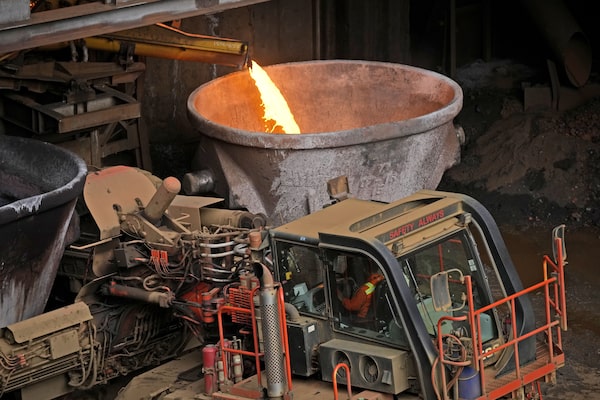
A worker operates a truck as molten slag is poured into a container at PT Vale Indonesia's nickel processing plant in Sorowako, Indonesia, in September, 2023.Dita Alangkara/The Associated Press
Deputy Prime Minister Chrystia Freeland says Canada and its allies are weighing taking trade action against China and Indonesia in the nickel market, as the two Asian countries tighten their collective grip in the critical mineral.
Indonesia has gone from supplying 7 per cent of the global output of nickel to 55 per cent in the past decade, with much of that new production controlled by China-based mining companies with ties to the authoritarian Beijing government.
The glut of new global supply out of Indonesia has caused the price of the steelmaking and battery metal commodity to plummet by more than 80 per cent from a peak of US$100,000 a tonne to around US$19,100 a tonne.
Western miners hope superior ESG credentials can revive their fortunes amid devastating nickel crash
Speaking to reporters in Toronto after addressing the First Nations Major Projects Coalition conference, Ms. Freeland said a flood of cheap nickel is making the operations of Western mining companies uneconomical and the conduct of the countries in control appears to be market manipulation.
“It is our belief that that behaviour can be intentional, can be happening with the purpose of driving companies in our country, [and] in those of our allies, out of business,” said Ms. Freeland.
“That is not good for our economies. It’s not good for our national security. So Canada is very actively working both domestically on what we can do, and perhaps even more importantly, working energetically with our democratic partners to discuss collective responses.”
When asked if tariffs might be part of the strategy, Ms. Freeland said because the matter was so serious, it wouldn’t be appropriate to discuss the matter in public.
“We are having productive conversations. We are in Canada, looking very carefully at ways that we can act as a country to defend our national economic interest,” she added.
Ms. Freeland said the importance of insulating Western supply chains in critical minerals against unfriendly countries was a topic of discussion in a meeting she had last week with fellow finance ministers from the Five Eyes intelligence-sharing alliance: Australia, New Zealand, Canada, the United States and Britain.
The crash in the nickel price is putting tremendous pressure on large Western producers. Canada’s First Quantum Minerals Ltd., Switzerland’s Glencore PLC and Australia’s Wyloo Metals Pty Ltd. in the past few months have closed nickel mines, idled production and issued bleak forecasts.
Earlier this year, Melbourne-based BHP Group Ltd., the world’s biggest mining company by market value, recently estimated that about half of all nickel production globally is money-losing, as the company incurred a US$2.5-billion impairment charge in its nickel business.
The low nickel price also potentially threatens the viability of new mines in Canada.
China and Indonesia’s rise in nickel production has come at a great environmental cost. Already one of the dirtiest industries, steel produced using low-grade Indonesian nickel – known as nickel pig iron, or NPI – is highly carbon intensive owing in part to the heavy reliance on thermal coal for power in China and Indonesia. In addition, the processing of NPI for use in the EV industry, including the use of metallurgical coal, adds greatly to emissions.
Indonesia has been engaged in anti-competitive trade practices in the nickel market for some time. In 2020, it banned the export of raw nickel in a bid to attract even more investment into the country from China. The European Union complained to the World Trade Organization that the ban was hurting its steel sector.
This isn’t the first time Canada’s federal government has expressed concern about China and Indonesia’s control of the nickel market. Federal Natural Resources Minister Jonathan Wilkinson in March said that supply gush created by China and Indonesia was facilitating market manipulation.
Aside from nickel, China has already locked up a dominant position in other critical minerals, such as lithium, cobalt and graphite, all of which are key materials used in electric vehicle batteries and other forms of lower-carbon energy sources.
 Niall McGee
Niall McGee